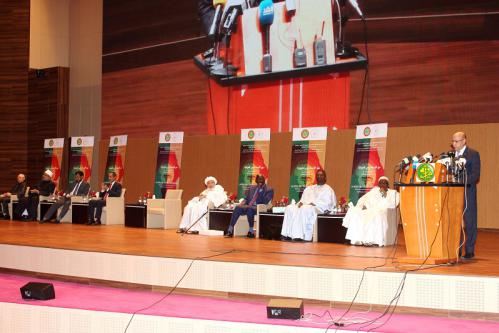Leading figures from the Muslim world, led by Sheikh Abdullah Ibn Bayyah, recently met in Nouakchott to draft a Declaration on Combating Religious Extremism.
By Ibrahima Dione
Sheikh Ibn Bayyah, determined to curb religious extremism, which he considers “the scourge of the century,” invited some 500 people to the Mauritanian capital, including ulema, educators, thinkers, ministers, muftis, imams and preachers.
His objective is clear: to provide an “intellectual and religious” response to this planetary phenomenon with a roadmap.
In its preamble, the Nouakchott Declaration stresses that Africa “can propose a comprehensive spiritual project to extinguish the flames of war and fight against extremism.”
Noting that this ideology “instrumentalizes religious thought to achieve destructive, destabilizing and threatening objectives against national and international peace,” the panel of experts therefore concluded that it is a “duty” to set up a shield.
The objectives of the participants in this conference are, among others, the elaboration of a comprehensive, operative, integrated plan to deal with extremism, belligerence and cross-border crime, the development of innovative, peaceful and legitimate ways of thinking and working mechanisms to deal with violence and extremism, the building of more bridges of cooperation between religions and cultures, or between people of religion active in the fields of human rights.
Furthermore, they aim at rehabilitating the thinking of religious tolerance and peaceful coexistence among individuals and peoples, inspired by universal human ideals and African values, and at giving impetus to the charter of the New Covenant of the Virtuous, highlighting its specificity, values and virtues it advocates, the promising prospects it opens up for coexistence and unity among peoples, based on understanding, cooperation and human fraternity.
After addressing religious extremism, Sheikh Abdullah Ibn Bayyah’s hosts proposed a set of means of combating it.
These include strengthening the presence of the State, its apparatus and institutions in areas far from the centres of power, developing decentralized local development projects and regional economic development, combating vulnerability, poverty, unemployment and promoting the culture of tolerance as a religious imperative and obligation of faith.
In addition, they advised regional organizations to pay special attention to the intellectual and religious aspect in their strategies, especially the African Union and the G5-Sahel, the establishment of specialized centres and universities in the African space to support the thinking of peace, moderation, respect for the values of citizenship and the rules of coexistence, and the establishment of a centre based in Nouakchott and working for the reintegration of people affected by ideas that lead to conflicts and internecine wars.
ID/te/lb/as/APA


